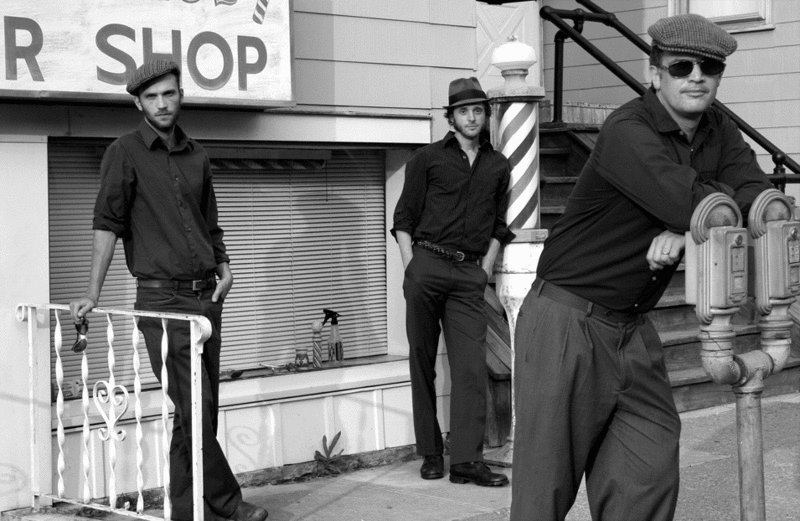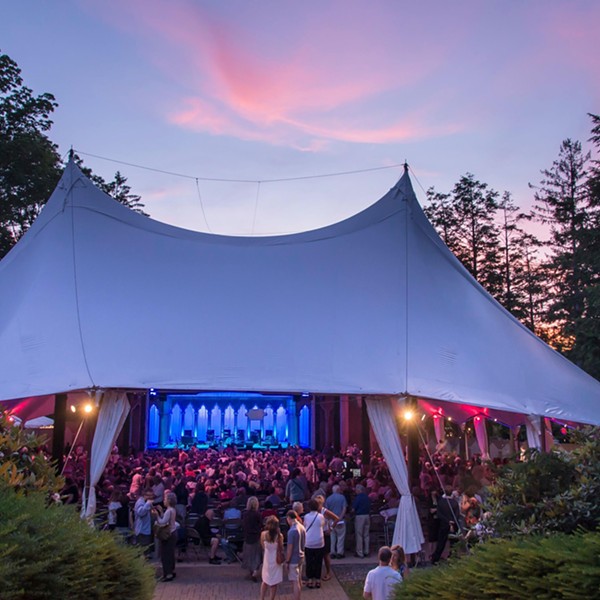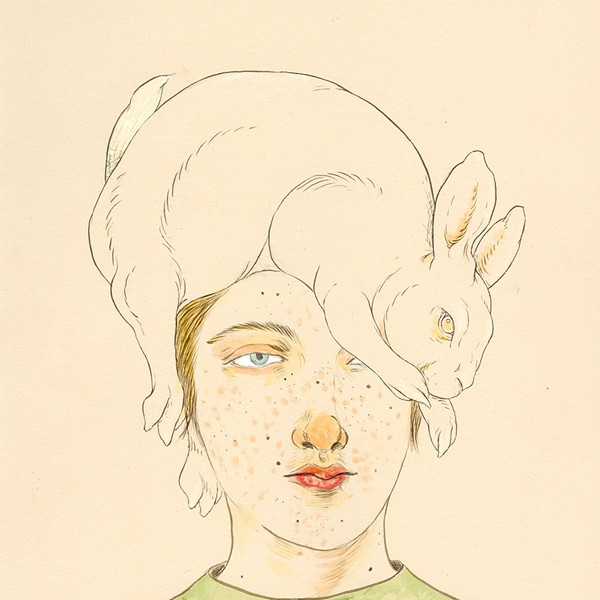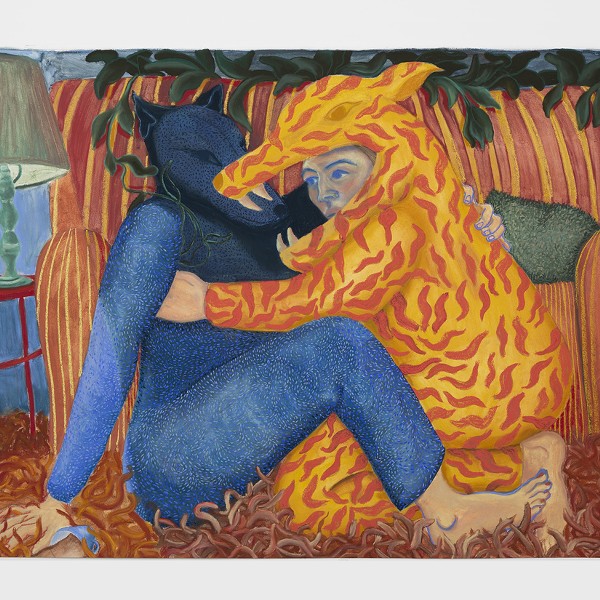Hunger Mountain is in Monterey, Massachusetts, about 10 miles east of Great Barrington. But on this early June day its peak is pretty much impossible to make out, thanks to the thick, rainy mist that blankets the Berkshires and makes the roads a sopping mess. On the other hand, the disagreeable weather also means it’s especially nice to be warm and dry in the Victorian parlor-like coziness of Club Helsinki’s dining room, sharing tea and veggie burgers with Hunger Mountain Boys’ singer, guitarist, and dobro player Teddy Weber and string bassist Matt Downing.
“Kip [Beacco, 37, sings and plays guitar, fiddle, and mandolin in the group] built a timber-frame house on that mountain,” says the sideburned, 30-year-old Weber from beneath his ever-present, beat-up fedora. “He and his family even live on Mount Hunger Road,” adds Downing, lean, scruffy, and 29.
Country-derived sounds have, of course, never fully disappeared from America’s musical landscape. But far too much of what’s been pumped out of Nashville in the name of country over the last several years has been either signifier-driven, boot-scootin’ schmaltz or, far worse, jingoistic, chest-beating hate music. Part of a burgeoning scene of new, tradition-conscious American acoustic artists, The Hunger Mountain Boys bypass the ill turns country has made in recent times, instead taking the music back to its 1920s and ’30s rural, string-band roots and injecting it with just the right amount of Noughties consciousness.
The roots in Weber’s life, however, haven’t only been of those of the musical variety. “I grew up in a little town in northern New Jersey called Branchville,” he recalls. “And in 1996 I moved to Maine to study forestry.” While each of his fellow members also sports a noteworthy performing resume (Beacco played in garage and jazz-fusion bands; Downing did time in top Philadelphia bluegrass outfit Jim & Jennie and The Pinetops), Weber’s is easily the most eclectic, including classical trumpet training and stints in ska bands and college jazz ensembles. After his tree-lined days in Maine, he went to Colorado for a year (“There’s a really big ‘newgrass’ scene there, but I wasn’t part of it.”) before ending up in the Berkshires/Hudson Valley area in the fall of 2001.
“When I got here, right away, I was like ‘I gotta meet the local musicians. I gotta find out what’s going on around here,’” Weber says. After spying one of their posters, he checked out a few gigs by The Beartown Mountain Ramblers, an early band that featured Beacco and Downing. (“We weren’t very good, but people loved us,” Downing says.) But Weber didn’t approach them directly.
“I had put up an ad saying, ‘Dobro player available for jamming or recording’ in a music store,” remembers Weber. “Of course, since there aren’t that many players around here who are into this stuff, Matt found the ad and called me up. We all started jamming at Kip’s house, me and about half the guys from the Ramblers and some other local musicians, and Kip and I just instantly hit it off. Matt was just about to go on the road with Jim & Jennie and The Pinetops, so the Ramblers were winding down and Kip was really gung-ho to start something with me.” And so with a hearty nod to legendary old-time country and bluegrass twosomes like those of the Delmore, Monroe, Louvin, Allen, and Stanley brothers, The Hunger Mountain Boys were born.
Weber and Beacco hit the festival and club circuits hard, where their trademark vintage suits and charming, microphone-sharing singing style made them stand out right away. But while cool visual elements are nice, they’re not much more than that if the band doesn’t have the goods to back them up. Rest assured, The Hunger Mountain Boys have the goods. In fact, they have the whole darn general store. On heart-tugging tearjerkers like their take on the timeless murder ballad “Katie Dear,” the pair’s aching high harmonies crest and coil around one another as they rise to meet the stars, helped along by the soaring slide of Weber’s steel dobro. On high-speed barnburners like the runaway “Departure Day,” Beacco’s razor-sharp mandolin sprints to the finish like a hunted fox, his agile fingers burning up the frets like pure white lightning.
After a time, the Boys decided to capture some of that lightning on disc. So they turned to Off The Beat-n-Track studios in nearby Sheffield, Massachusetts, where they cut their first two rollicking CDs, 2003’s Fashioned in the Old Way and 2004’s Blue Ribbon Waltz. Both were released on the group’s own Old-Fi Records with producer Todd Mack, who also hosts “The Off The Beat-n-Track Radio Show” on WKCR. Both discs are now out of print.
“Working with The Hunger Mountain Boys has been a great experience, totally,” says Mack. “Their level of musicianship is just so high, it’s a pleasure just to watch them play. And their songcraft is just amazing. On their records, the split might be 50 percent covers and 50 percent originals, but unless you already know the tunes it’s hard to tell which is which. They never sound like they’re trying to be old-time, they just sound real; their whole thing is totally authentic. But they’re still pretty open-minded guys, always game for a little experimentation.”
In 2006, the band added Beacco’s and Weber’s old buddy Downing in time to record the appropriately named Three (Old-Fi Records) in Beacco’s basement studio. And the music itself expanded, bringing in elements of ragtime, early jazz, and Western swing. The trio started touring more out West, down South, and overseas, amassing elated new fans on mainland Europe and in the British Isles, where the group has perhaps found its warmest reception outside the US. And in addition to their band’s sharing the stage with some of their heroes—Ralph Stanley, Doc Watson, Taj Mahal, Jim Lauderdale, Del McCoury—the members have even guested on records by hot whippersnappers like Neko Case and Devendra Banhart.
Recently, the band has begun gearing up for yet another lineup change. With baby number two on the way, Beacco unsurprisingly isn’t able to tour as much as before, so the band has drafted in ex-Crooked Jades fiddler and mandolinist Adam Tanner to fill his shoes—making The Hunger Mountain Boys a veritable old-time supergroup.
But Weber and Downing hope Beacco’s time off isn’t permanent. “Our dream is to have him come back and for us to be a quartet. We’ll see what happens,” Weber says. “But we at least hope to do some regional shows and to record with both Kip and Adam.” During the periods when Beacco’s familial duties have kept him off the road, Weber and Downing have marked time with The Blue Ribbon Boys, a band that developed more or less concurrently with their main group and whose repertoire includes blues, swing, klezmer, and novelty-pop tunes in addition to early country.
In the wake of 2000’s hit film O Brother Where Art Thou and its millions-selling, old-time-dominated sound track, a new generation of youthful roots-revisionists has popped up: Old Crow Medicine Show, Crooked Still, The Wiyos, King Wilkie, The Shiftless Rounders, The Crooked Jades, Eilen Jewell, the list grows. But do we really have only the Coen Brothers to thank for this welcome wave?
“No, I think the O Brother thing was really just a matter of timing,” Weber says. “A certain amount of younger people were just ready for this music. It’s why you see a lot of these sort of vagabond, ex-punk-rocker types wandering around with fiddles and banjos. It’s the simplicity. You can just buy a banjo and start out by learning a few easy tunes.
“Plus, it’s just such social music,” he adds. “Some of the best times I’ve had in my life have been with the guys in this band, playing this music. Whether we’re on stage, or just driving along at two o’clock in the morning listening to Django Reinhardt. I love it.”
Traditionally, whenever there’s been a rise in technology, there’s also been an equal and opposite reaction against it: Witness the aesthetic Arts and Crafts movement during the Industrial Revolution or the folk-music boom on the heels of the Jet Age. Today it’s the explosion of the Internet, although, ironically, the growth of the Web has, like that of radio in the ‘20s, immeasurably helped to spread old-time music. “It’s true. Can you imagine promoting a band now without the Internet, cell phones, all of this stuff?” Weber ponders. “It makes it so much easier.”
So how did he and his young bandmates come to discover this seemingly forgotten music in the pre-MySpace age? “For me, it was by listening to ‘A Prairie Home Companion’ on NPR around the house when I was a kid,” Weber says, adding, “That was my ‘Grand Ole Opry.’” (Although the group hasn’t yet realized its collective dream of performing on the Garrison Keillor-hosted program, the Weber-Beacco lineup won a songwriting contest sponsored by NPR’s popular “Mountain Stage” and played on that show in 2003.)
For Downing, a carpenter by day, the origins of his love of acoustic music are a little more tactile. “One day it just hit me that the music I was hearing on the big-time, commercial radio stations just sucked. And it had nothing to do with me,” he recalls. “So I figured I had to make the music I wanted to hear myself, not let them do it for me. And that’s what I’m doing. It’s what this band is doing.”
The gifts we make by hand are always the ones that mean the most.
The Hunger Mountain Boys’ Live & Early Studio Duets is out now on Old-Fi Records. The Blue Ribbon Boys, featuring Teddy Weber and Matt Downing, will play at Claverack Town Park in Mellinville, New York, on July 5 and at Club Helsinki in Great Barrington, Massachusetts, on July 27. www.hungermountainboys.com.


















